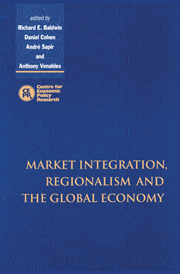Book contents
- Frontmatter
- Contents
- List of figures
- List of tables
- Preface
- Acknowledgements
- List of conference participants
- 1 Introduction
- PART ONE REGIONALISM AND THE GLOBAL ECONOMY
- 2 Regionalism vs. multilateralism
- Discussion
- 3 Preferential agreements and the multilateral trading system
- Discussion
- 4 Politics and trade policy
- Discussion
- 5 Globalisation and labour, or: if globalisation is a bowl of cherries, why are there so many glum faces around the table?
- Discussion
- 6 Openness and wage inequality in developing countries: the Latin American challenge to East Asian conventional wisdom
- Discussion
- PART TWO MARKET INTEGRATION AND REGIONALISM
- Index
2 - Regionalism vs. multilateralism
Published online by Cambridge University Press: 24 February 2010
- Frontmatter
- Contents
- List of figures
- List of tables
- Preface
- Acknowledgements
- List of conference participants
- 1 Introduction
- PART ONE REGIONALISM AND THE GLOBAL ECONOMY
- 2 Regionalism vs. multilateralism
- Discussion
- 3 Preferential agreements and the multilateral trading system
- Discussion
- 4 Politics and trade policy
- Discussion
- 5 Globalisation and labour, or: if globalisation is a bowl of cherries, why are there so many glum faces around the table?
- Discussion
- 6 Openness and wage inequality in developing countries: the Latin American challenge to East Asian conventional wisdom
- Discussion
- PART TWO MARKET INTEGRATION AND REGIONALISM
- Index
Summary
Introduction
The literature on ‘regionalism vs. multilateralism’ is burgeoning as economists and a few political scientists grapple with the question of whether regional integration arrangements (RIAs) are good or bad for the multilateral system as a whole. Are RIAs ‘building blocks or stumbling blocks’, in Bhagwati's (1991) memorable phrase, or stepping stones towards multilateralism? As we worry about the ability of the WTO to maintain the GATT's unsteady yet distinct momentum towards liberalism, and as we contemplate the emergence of world-scale RIAs – the European Union, NAFTA, FTAA, APEC and, possibly, TAFTA – this question has never been more pressing.
‘Regionalism vs. multilateralism’ switches the focus of research from the immediate consequences of regionalism for the economic welfare of the integrating partners to the question of whether it sets up forces which encourage or discourage evolution towards globally freer trade. The answer is ‘we don't know yet’. One can build models that suggest either conclusion, but to date these are sufficiently abstract that they should be viewed as parables rather than sources of testable predictions.
Moreover, even if we had testable predictions we have very little evidence. Arguably the European Union is the only RIA that is both big enough to affect the multilateral system and long-enough lived to have currently observable consequences. The European Union allows one convincingly to reject the hypothesis that one act of regionalism necessarily leads to the collapse of the multilateral system. But it is difficult to go further: the anti-monde to EU creation is unknown and one does not know to what extent the European Union is special.
- Type
- Chapter
- Information
- Publisher: Cambridge University PressPrint publication year: 1999
- 11
- Cited by



